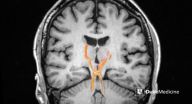(Press-News.org) Scientists are beginning to unwrap the biology behind why some people are more prone to major depression and other psychiatric disorders than others when experiencing stressful life events. The researchers found that cellular activity in response to stress hormone receptor activation differs from individual to individual. The study, led by Janine Arloth, Ryan Bogdan, and Elisabeth Binder at the Max Planck Institute of Psychiatry in Germany, also shows that the genetic variations underlying this difference in stress response correlate with dysfunction in the amygdala, a brain region that is an important part of the stress hormone response. Watch the paper's video abstract on YouTube.
Neuron, Arloth et al.: 'Genetically determined differences in the immediate transcriptome response to stress predict risk-related brain function and psychiatric disorders' http://dx.doi.org/10.1016/j.neuron.2015.05.034
Link between schizophrenia and individual variations in GABA and glutamate transmission grows stronger
New evidence suggests that schizophrenics possess mutations affecting genes associated with GABA, a neurotransmitter that relaxes nervous system activity. The analysis, which included the largest sample size to date -- comparing the genes of 11,500 people with schizophrenia to 16,500 people without the disorder -- also replicated and expanded upon previous research implicating schizophrenia with genes related to the excitatory neurotransmitter glutamate. Neuroscientists Andrew Pocklington, Michael O'Donovan, and Michael Owen of Cardiff University led the study, which did not find significant differences between the two groups in genes unrelated to the central nervous system.
The authors believe that the risk of schizophrenia depends on the total burden of mutations and that no single gene can be blamed for acquiring the disorder. Mutations in genes that can disrupt GABA and glutamate signaling, however, appear more likely than others to be associated with schizophrenia among the most clearly involved.
'Perturbation of these processes is likely to have a widespread impact on brain function, and only a subset of genetic lesions within these systems may be compatible with a schizophrenia phenotype,' write the authors. 'The identification of the mechanisms by which disruption of these processes by genetic mutation leads to psychopathology will doubtless require experimental studies in model systems of high construct validity.'
Neuron, Pocklington et al.: 'Novel findings from CNVs implicate inhibitory and excitatory signalling complexes in schizophrenia' http://dx.doi.org/10.1016/j.neuron.2015.04.022
An argument to pinpoint the GABA receptor as a drug target for neurodevelopmental disorders
Thousands of genes have been linked to neurodevelopmental disorders, including autism and epilepsy, complicating attempts to find any one particular drug or therapy that could help patients. One lead from gene sequencing studies is the revelation that many of the genes associated with these disorders converge on a limited number of functional pathways.
Geneticists Sien Braat and R. Frank Kooy of the University of Antwerp argue that one intriguing commonality between neurodevelopmental disorders is a disturbance in the function of GABA signaling, responsible for preventing too much brain activity. Based on research using drugs targeting GABA signaling to treat fragile X syndrome in animal models, the researchers believe that clinical trials using these drugs (already approved for human use) would be worth pursuing for a wider range of neurodevelopmental disorders.
'Due to the genetic heterogeneity observed, targeted treatment aimed at interference with pathways commonly disturbed in multiple disorders might be the only realistic option,' write the authors. 'Results of preclinical trials in several [neurodevelopmental] disorders have shown encouraging results and raised hopes for treatment in patients.'
Neuron, Braat and Kooy: 'The GABAa Receptor as a Therapeutic Target for Neurodevelopmental disorders' http://dx.doi.org/10.1016/j.neuron.2015.03.042
INFORMATION:
Neuron, published by Cell Press, is a bimonthly journal that has established itself as one of the most influential and relied upon journals in the field of neuroscience and one of the premier intellectual forums of the neuroscience community. It publishes interdisciplinary articles that integrate biophysical, cellular, developmental, and molecular approaches with a systems approach to sensory, motor, and higher-order cognitive functions. For more information, please visit http://www.cell.com/neuron. To receive media alerts for Neuron or other Cell Press journals, please contact press@cell.com.
This news release is available in German. Scientists at the German Center for Neurodegenerative Diseases (DZNE) and the University of Bonn led by Prof. Stefan Remy report on this in the journal "Neuron". Their investigations give new insights into the workings of spatial memory. Furthermore, they could also help improve our understanding of movement related symptoms associated with Parkinson's disease.
In a familiar environment our movements are purposeful. For example, if we leave our office desk for a coffee break, we naturally follow a predefined route that has ...
This news release is available in German.
Contaminated samples have evidently created some confusion in the timetable of life. On the basis of ultra-clean analyses, an international team, including scientists from the Max Planck Institute for Biogeochemistry, has disproved supposed evidence that eukaryotes originated 2.5 to 2.8 billion years ago. In contrast to prokaryotes such as bacteria, eukaryotes have a nucleus. Some researchers thought they had discovered molecular remnants of living organisms in rock samples up to 2.8 billion years old. However, as the ...
A team of New York University neuroscientists has determined how a pair of growth factor molecules contributes to long-term memory formation, a finding that appears in the journal Neuron.
"These results give us a better understanding of memory's architecture and, specifically, how molecules act as a network in creating long-term memories," explains the paper's senior author, Thomas Carew, a professor in NYU's Center for Neural Science and dean of NYU's Faculty of Arts and Science. "More importantly, this marks another step toward elucidating the intricacies of memory ...
DURHAM, N.C. - Scientists at Duke Medicine have produced a 3-D map of the human brain stem at an unprecedented level of detail using MRI technology.
In a study to be published June 3 in Human Brain Mapping, the researchers unveil an ultra high-resolution brain stem model that could better guide brain surgeons treating conditions such as tremors and Parkinson's disease with deep brain stimulation (DBS).
The new 3-D model could eliminate risky trial-and-error as surgeons implant electrodes -- a change akin to trading an outdated paper road atlas for a real-time GPS.
"On ...
An international team of scientists led by Cardiff University researchers has provided the strongest evidence yet of what causes schizophrenia - a condition that affects around 1% of the global population.
Published today (17:00BST, 03/06/2015) in the journal Neuron, their work presents strong evidence that disruption of a delicate chemical balance in the brain is heavily implicated in the disorder.
In the largest ever study of its kind, the team found that disease-linked mutations disrupt specific sets of genes contributing to excitatory and inhibitory signalling, ...
A large majority of Americans--including gun owners--continue to support stronger policies to prevent gun violence than are present in current federal and most state law, according to a new national public opinion survey conducted by researchers with the Johns Hopkins Center for Gun Policy and Research at the Bloomberg School of Public Health.
The survey is a follow-up to one conducted by the same researchers in early 2013, shortly after the shooting at the Sandy Hook Elementary School in Newtown, Connecticut that left 26 dead.
The results are published online in Preventive ...
This news release is available in French. Professors Frederick Gosselin and Daniel Therriault, along with their master's student Renaud Passieux, are not related to Spiderman. Nevertheless, these Polytechnique Montreal researchers have produced an ultra-tough polymer fibre directly inspired by spider silk! They recently published an article about the project in the journal Advanced Materials.
Spider silk: a thread with stunning properties
Three to eight microns in diameter but five to ten times tougher than steel or Kevlar: despite its lightness, spider silk has ...
Love the opera? Hungry for hip hop? It turns out that your musical likes and dislikes may say more about you than you think, according to UBC research.
Even in 2015, social class continues to inform our cultural attitudes and the way we listen to music, according to the study, which was recently published in the Canadian Review of Sociology.
"Breadth of taste is not linked to class. But class filters into specific likes and dislikes," said Gerry Veenstra, study author and professor at UBC's Department of Sociology.
The study involved nearly 1,600 telephone interviews ...
A NASA-generated animation of NOAA's GOES-West satellite imagery from June 1 to 3 showed Hurricane Andres' eye disappear as the storm weakened into a tropical storm.
NOAA's GOES-West satellite has provided continuous visible and infrared imagery of the former hurricane since it was born. An animation created by the NASA/NOAA GOES Project at NASA's Goddard Space Flight Center in Greenbelt, Maryland captured the storm as it made the transition from a hurricane, back into a tropical storm. Andres is located in the Eastern Pacific Ocean, south of Baja California, Mexico. ...
Alcohol use disorder as defined by a new diagnostic classification was widespread and often untreated in the United States, with a lifetime prevalence of 29.1 percent but only 19.8 percent of adults were ever treated, according to an article published online by JAMA Psychiatry.
Alcohol use disorders are among the most prevalent mental health disorders worldwide, resulting in disability and contributing to illness and death. Because of the seriousness of alcohol use disorders, updated epidemiologic data are needed given the changes to the alcohol use disorder diagnostic ...



